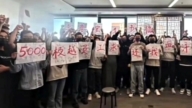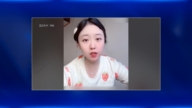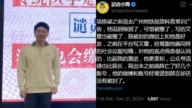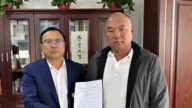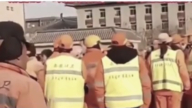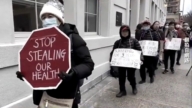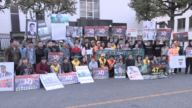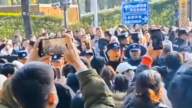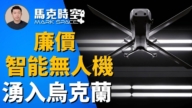【新唐人2012年10月22日讯】中共解放军家庭出身的西藏历史学者李江琳,出版了她的第二本书—-《当铁鸟在天空飞翔》。书中描述了中共50年代对西藏发动的“秘密战争”。而,笃信佛教,天性淳朴的西藏人,跟共产党残酷无情的枪炮飞机之间,构成强烈对比。李江琳向本台记者表示,共产党对西藏人民的暴力镇压和摧毁信仰,其实跟它对内地汉族人民所作的没有本质上的区别。所谓“汉藏矛盾”,实质上是“共藏矛盾”。
1956年至1962年,中共解放军以“民主改革”及“平反叛乱”之名,在藏区大规模杀掠。战火下寺院崩塌、经卷焚毁、藏民伤亡近35万人,藏族佛教传统文化几被摧毁。这段血腥镇压的史料一直残破不全。出版《当铁鸟在天空飞翔》著作的西藏历史学者李江琳在前言中写道,“这场战争是中共全面夺取政权后,在境内时间最长、规模最大的军事行动之一。”而“从军事角度来说,中共在藏区的战争是一场全胜的战争。奇怪的是,它也是中共宣传最少的战争。几十年来,这场战争被小心翼翼的地回避和掩饰着。”
李江琳走访了数百位西藏耆老、搜罗史料及机密档案,以“还原史实”。
李江琳认为,中共对西藏的这场杀掠是现代西藏问题的起源。
西藏历史学者李江琳:“我们看到的很多事情,2008年拉萨事件,再往前一点,80年代末的拉萨事件,以及现在的藏人自焚。现在我们看到的这些事情,实际上都是那场战争的后遗症。它一直在延续。”
“达赖喇嘛基金会”董事长达瓦才仁表示,这场战争成为西藏民族最铭心刻骨的一场记忆。
“达赖喇嘛基金会”董事长 达瓦才仁:“对所有的西藏人来说都是这样。就像2008年拉萨抗议的时候,西藏人说,我们是58年被你们打死的西藏人。因为西藏有转世的观念。”
住在黄河源头,从没见过汉人的西藏先人,面对中共正规军,李江琳说,“藏人渡过黄河,解放军在河岸整遍扫射,居然不知道要躲子弹。战机低空投弹,藏人还对飞机指指点点。”
李江琳对《新唐人》表示,不仅藏族是淳朴的民族,几十年前,在没有经过战争和“土改”,没有经过粗暴残酷的政治运动清洗的中国农村,中国人本身也很淳朴。
李江琳:“至于在西藏,在这个地方发生的战争,实际上是中共建政,构建国家权力的一部分,它所发生的一切,跟内地没有什么本质的区别。在内地它是夺取政权,然后构建国家权力,它在藏区发生的一切也是这样。”
李江琳认为,相信“无神论和暴力”的中共,在镇压汉、藏两族人民的同时,也摧毁着他们对神的信仰。
李江琳:“阶级斗争它是讲究屠杀是合理的,斗争是合理的,这和讲究慈悲,反对杀生的佛教意识形态,它本质就是不一样的,而且本质就是相对的。它在中国各地都一样。实际上,藏区的寺院摧毁是中国大地上最后一批的摧毁。在此之前,在中国内地其他地区各省各种宗教的寺院基本上已经都摧毁了。”
达赖喇嘛曾经一再表示,藏人遭受的这一切,不是中国人民的责任,而是中国政府的责任。李江琳引述达赖喇嘛的话说,“我们始终对中国人民没有放弃过信心”。
李江琳:“我们大多数中国人至今对50年代在青藏高原发生的事件是一无所知的。所以我不大认为,汉藏问题是一个好的用词,我认为这个问题是共藏问题,不是汉藏问题。”
《当铁鸟在天空飞翔》是李江琳历时一年半所写,书名来自莲花生大师在西元八世纪的预言,“当铁鸟在天空飞翔,铁马在大地奔驰之时,藏人将像蚂蚁一样流散世界各地,佛法也将传入红人的国度。”
采访编辑/秦雪 后制/王明宇
When The Iron Bird Flies: A Secret War
Born in a people’s liberation army (PLA) family, the Tibet
historian Li Jianglin published her second book, “When the Iron Bird Flies."
The book describes the secret war launched by the
Chinese Communists in the 1950s in Tibet.
The devout Buddhist and honest nature of the Tibetans formed
a sharp contrast to the ruthless guns and aircrafts of the Communist Party.
Li Jianglin told NTD reporter that the CCP has repressed
with violent and destroyed the faith in both Tibet and the Han people.
The so-called “Sino-Tibetan conflict" in essence
is the “Communist-Tibetan conflict."
Between 1956 and 1962, in the name of democratic reforms
and “vindication of the insurgency," the PLA conducted massive killing in Tibet.
As a result, temple collapsed, doctrine burned, nearly 350,000
Tibetans died or were injured, and Buddhist culture was nearly destroyed.
Historical data about this bloody repression
has never been complete.
In the preface, author of “When the Iron Bird Flies,”
Li Jianglin wrote,
“This is one of the longest and largest military operations
ever took place in the mainland since the CCP seized power."
“From the military point of view,
this war of the CCP in Tibet is a complete victory.
Strangely enough, it is also the least publicized by the CCP.
For decades, this war has been carefully evaded and covered up."
Li Jianglin visited hundreds of elderly Tibetans and collected
historical documents and confidential files to “restore the historical facts."
Li Jianglin believes this killing is the origin of current Tibet issue.
Tibet historian Li Jianglin: “Many incidents such as
the Lhasa incident in 2008, the Lhasa incident in the late 1980s,
and the Tibetan self immolations now, are actually
the after-effects of that war. It continues to date."
Dawa Tsering, Tibet Religious Foundation of His Holiness
the Dalai lama, indicates that war has been inscribed in the Tibetans.
Chairman of the Tibet Religious Foundation of His Holiness
the Dalai lama, Dawa Tsering: “It is the situation to all Tibetans.
Just like during the protests in Lhasa in 2008, Tibetans said,
‘We are the Tibetans you killed in 1958.’ It is the concept of reincarnation in Tibet."
Having lived upstream of the Yellow River,
the Tibetan ancestors had never seen Han Chinese.
While facing the CCP army, Li Jianglin says,
“People’s Liberation Army fired along the bank.
Those Tibetans who crossed the Yellow River did not know
to hide from the shooting.
While warplanes were bombing, the Tibetans were simply
looking and talking about the aircrafts."
Li Jianglin indicates to the New Tang Dynasty that it’s not
just Tibetans who are simple.
Decades ago when there was no killing, no land reform,
no brutal and cruel political movement, rural Chinese were very simple.
Li Jianglin: “As for the killing in Tibet, in fact, served
to build the CCP’s state power.
It was just like what happened in Mainland where the CCP
also fought to seize power and built its political power.
It’s the same in Tibet."
Li Jianglin believes that the atheist and violent CCP has been
suppressing both Han and Tibetan peoples, and destroying their belief at the same time.
Li Jianglin: “Class struggle sees it reasonable to kill and to
struggle, whereas the compassionate Buddhist ideology opposes killing.
These two are completely the opposite.
It is so throughout the land.
In fact, destroying the Tibetan monasteries was the
last destination of the CCP destroying act.
Prior to that, temples of various religious in all other provinces
of Mainland China have all been basically destroyed."
The Dalai Lama has repeatedly said that all that the Tibetans
have suffered is not the responsibility of the Chinese, but that of the Chinese government.
Li Jianglin quoted the Dalai Lama as saying,
“We have never given up our confidence in the Chinese."
Li Jianglin: “Most Chinese know nothing about
what happened in the Qinghai-Tibet Plateau in the 1950s.
I do not quite believe that
the Sino-Tibetan problem is good wording.
I think the problem is between the Communists and Tibet,
not the Hans and Tibetans."
“When the Iron Bird Flies" took Li Jianglin one and a half years.
The title comes from the prophecy of Guru Padmasambhava
in the eighth century AD,
“When the iron bird flies, and horses run on wheels,
the Tibetan people will be scattered like ants across the world and the Dharma will come to the land of the Red Man."


